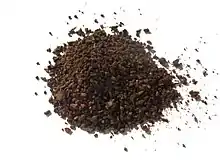

A cereal coffee (also known as grain coffee, roasted grain drink or roasted grain beverage) is a hot drink made from one or more cereal grains roasted and commercially processed into crystal or powder form to be reconstituted later in hot water. The product is often marketed as a caffeine-free alternative to coffee and tea, or in other cases where those drinks are scarce or expensive.[1]
Several well-known cereal coffee brands are Nestlé Caro, Postum, and Inka. Other brands can be found at health food stores and at some grocery stores. Some common ingredients include toasted barley, malted barley, rye, chicory, molasses, brown rice, chickpeas, sorghum, and beet root.
Use
Asia
Cereal coffee is popular in East Asian cuisines—Korea,[2] Japan, and China each having one or more versions (usually roasted grains simply steeped in hot water).
- Barley tea (bori-cha, dàmài-chá, mugi-cha)
- Rice tea
- Brown rice tea (hyeonmi-cha, nước gạo lứt)
- Sungnyung
- Corn tea (oksusu-cha)
- Job's tears tea (yulmu-cha)
Grain-like seeds and pseudocereals are used to make similar drinks.
- Buckwheat tea (memil-cha, soba-cha)
- Sicklepod tea (gyeolmyeongja-cha)
Grain teas can also be blended with green tea or other tea drinks.
- Brown rice green tea (hyeonmi-nokcha)
Ethiopia
Traditionally known as "Kafir coffee[3]" in Ethiopia, cereal coffee made from roasted sorghum offers a bright, citrusy taste with a subtly astringent finish.
Europe
Some notable Polish brands which specialize in cereal coffee are Inka, Krakus and Anatol.
In Czech Republic, a Kávoviny Melta brand has been roasting grain coffee since 1896.
Such roasted grain mixes are also used as a base to make podpiwek, a type of non-alcoholic beverage.
See also
- Coffee substitute
- Ersatz good – Substitute good, particularly in wartime
- Grain milk
- List of barley-based drinks
- Mash ingredients
References
- ↑ "How Cereal Coffee Became The Ultimate Coffee Alternative". 2023-12-26. Retrieved 2023-12-26.
- ↑ Alex Jung, "20 delicious Korean drinks", CNN.com, October 13, 2011.
- ↑ Tirfe, Million; Alemu, Asnakech; Alemu, Wondie; Woldearegay, Mengistab; Asfaw, Getachew; Gerba, Heran; Kadi, Duru; Fentie, Atalay Mulu (2023). "A three years antimicrobials consumption in Ethiopia from 2017 to 2019: A cross- sectional study". PLOS ONE. 18 (4): e0284038. Bibcode:2023PLoSO..1884038T. doi:10.1371/journal.pone.0284038. ISSN 1932-6203. PMC 10079031. PMID 37023072.